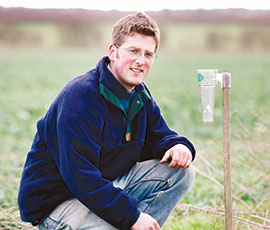FARMER FOCUS: A lesson in welly buying

I am just starting to think that Father Christmas might not exist.
There is no sign of Keira Knightley on a quad bike, wheat and rape prices are on the decline and then there is the weather.
The weather is excelling itself again with night-time temperatures pushing 10C and the folk in the West Country reaching for their arks, while the shooting fields here are full of unhittable pheasants flying far too fast in the never-ceasing gales.
Any thoughts of planting late wheat have been shelved now. The land is wet, the trial areas we have drilled have been ravaged by crows, and the blackgrass just keeps coming.
The aggressive growth of blackgrass has been astonishing this year, and having made the decision to try and get on top of the problem, it seems naive to maul some wheat in just to try and stop being the butt of all the jokes when in the pub with neighbouring farmers.
It is with huge regret I have to announce that after five years good service my wellies have become unrepairable. They were the expensive ones, although not as expensive as the new ones, with neoprene lining and full support.
Yet wellington boot shopping used to be so easy; one quick visit to the local ag dealer and hey presto you would have a pair of hastily arranged rubber mouldings obviously designed to fit someone else’s feet with the insulation value of a sarong.
Now there are 100s of sites on the internet selling wellies, all at slightly different prices and specifications. After an hour’s research the best deal was… my local dealer. In the hour I wasted I could have been and bought the wellies, got home and walked the dog.
With my main capital expense of the year coming so soon, there are going to be many disappointed salesmen at Lamma.
My main focus will be on small stands that offer clever solutions and modifications to perennial problems.
I will continue to walk past the plough makers with a nervous sideways glance in the hope that I really will not have to resort to owning one again.
Will Howe farms 384ha of medium to heavy land at Ewerby Thorpe Farm, near Sleaford, Lincolnshire, growing wheat, oilseed rape and winter beans

